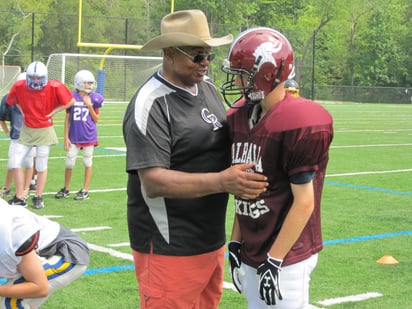Whether you are coaching T-Ball or at the varsity high school level, your role as a leader of young athletes should extend far beyond teaching the sport fundamentals. Reaching out to today’s youth is not always an easy task, but as a coach, you are in an advantageous position to become a mentor.
You may think the idea of a coach accepting the additional responsibility of mentorship is a relatively new concept. The fact is the coach/mentor tie-in has been around since the beginning of organized sports. Look at college basketball coach John Wooden and the NFL’s Vince Lombardi. While they are remembered for winning championships and building dynasties in their respective sports, they are praised more so for the way they delivered powerful life lessons to their players. The ‘Pyramid of Success’ developed by Wooden, and the motivational attitude of Lombardi remain valued sources of inspiration used by corporations and individuals.
Some coaches feel that mentoring a young athlete has to mirror the ways of the work world. A meeting is scheduled, a specific amount of time is blocked off on the daily planner and the two people meet face-to-face. Thankfully, this is not necessary and your mentoring sessions will come about in a casual, more organic way. A few minutes during a water break or a quick walk up to the athlete while heading to the locker room can bring about surprising results. Players become comfortable around coaches and learn to initiate such mentoring moments on their own.
The ‘mentor radar’ must always be on high alert with coaches. “How are your grades?” An easy question such as this while walking off the practice field is a great starting point. This quickly eliminates the barrier between the athlete and you. You are not talking about the practice mishaps. You are showing a personal interest in the player. A mentoring session is about listening and understanding what is going on inside your player’s head, and it does not have to be necessarily long.
There are ways to mentor athletes in small groups as well. After hitting fly balls to the outfielders, get them together and talk about something not related to sports. Open up a short conversation about the latest movie, or an appropriate news event. Get your players to start interacting with each other. This will make it easier for them to approach you, both as a coach and as a mentor.
You want to keep the communication lines open, so be careful not to cut one of your players short when they approach you. When a player decides to confide in you about a personal issue, now is not the time to turn your back. Even if practice lasted twenty minutes longer than expected, and you are already late for the family dinner. If you fail to listen to your player, you’ll lose all the mentoring ground you have gained from past sessions.
The end of every practice should include insight directly involving your players. This is the time you may want to talk about issues that may be common among all players -- for instance if a teacher or parent approached you regarding a few players who decide it is ‘cool’ to leave their lunch trays on the cafeteria tables instead of busing them. You don’t have to single out any of the players, but acknowledge you are aware of such inappropriate behavior and how this has an effect on how others view the team. Providing such positive leadership to youth can go a long way in terms of your players becoming better people overall.











.png)
.png)
.png)
.png)